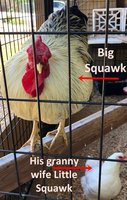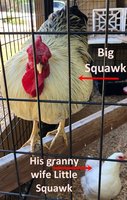RenoHuskerDu
Songster
Our rooster does not deserve the name. He only roosts one hen, an old one that doesn't lay anymore. The two of them are always the first in bed, like some old married couple settling in to bed to watch the dishonest evening news every night.
The other 10 hens wander in, hopefully, later. Or we have to go look for them to close up the coop. The funny thing about our rooster is that he's only a few years old, but acts like a grandpa.
So I want to buy a few more layers and a young rooster. Any advice on how to proceed, so the new rooster actually roosts the hens? How old is the best age to buy a young rooster? Should we start him off in his own coop with the new birds, then migrate them to the big coop? Or just move them all in under cover of dark right away? How to best mitigate the rooster fighting issue?
Thanks for any advice!

The other 10 hens wander in, hopefully, later. Or we have to go look for them to close up the coop. The funny thing about our rooster is that he's only a few years old, but acts like a grandpa.
So I want to buy a few more layers and a young rooster. Any advice on how to proceed, so the new rooster actually roosts the hens? How old is the best age to buy a young rooster? Should we start him off in his own coop with the new birds, then migrate them to the big coop? Or just move them all in under cover of dark right away? How to best mitigate the rooster fighting issue?
Thanks for any advice!
Attachments
Last edited:







